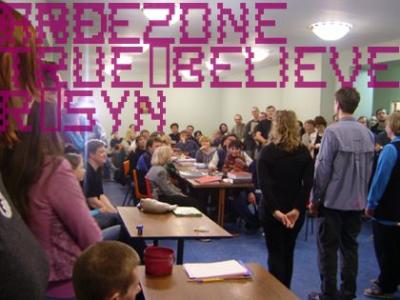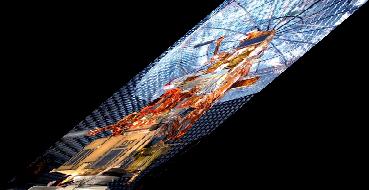
True-believer syndrome is a term coined by M. Lamar Keene in his 1976 book The Psychic Mafia referring to an irrational belief in paranormal events, even after direct confession or evidence that the events were fraudulently staged. Keene, himself a reformed fraudulent medium, exposed a number of other fraudulent psychics, faith healers, and miracle workers. When their followers only seemed to grew stronger, he started to view this inability to recognize fraud as a cognitive disorder. He believed that true-believer syndrome "merits study by science" and is the greatest thing phony mediums have going for them. While the psychology of religion does study irrationality, the term "true believer syndrome" is not an accepted scientific term and mainstream psychologists, psychiatrists or doctors do not consider irrationality a cognitive disorder.citation needed]
Contents
- 1 Usage of the term
- 1.1 Original usage
- 1.2 The True Believer
- 2 Examples
- 3 See also
- 4 References
- 4.1 Bibliography
- 5 Further reading
Usage of the term
There is some confusion as to the proper use of the term. It was originally used by Keene very specifically about the continued belief after a fraud has been exposed, even by the original fraudsters, but the term is also used more broadly about belief that lacks evidence.
Original usage
In The Psychic Mafia, the Rev. Canon William V. Rauscher and M. Lamar Keene describe a difference between true-believer syndrome and general belief in the paranormal. In the foreword to this book, Rauscher wrote that he accepts the reality of paranormal manifestations and that "good mediums" do exist. Rauscher does not see this type of belief as being indicative of true-believer syndrome. Keene explicitly professed a belief in life after death, psychic phenomena and <ESP, even after making his case against true believers and renouncing his trade as a phony medium.<Therefore, Rauscher and Keene do not condemn or belittle belief in the paranormal. They condemn and belittle persisting belief in events that have been openly faked, with a full admission of fraud, and refer to this persisting belief as "true-believer syndrome".
The True Believer
The "true believer syndrome" is sometimes used more broadly in the sense of Eric Hoffer's general study of fanaticism in <The True Believer (1951). For example, Jay A. Weinstein refers to the true believer syndrome in the context of anti-establishment activities and refers to Hoffer.
The American philosophy professor, and self-professed "hardened skeptic",Robert T. Carroll stated in the Skeptic's Dictionary that true-believer syndrome may account for the popularity of Deepak Chopra, Uri Geller, Sathya Sai Baba and James Van Praagh.
See also
- Psychology of religion
- Consensus theory of truth
- Delusion
- Sociology of knowledge
- Cognitive dissonance (immunity to CD)
- Magical thinking
- Wishful thinking
- Critical thinking
- Superstition
- Denial
- Doublethink
- Supernaturalization
- Placebo effect
- Viruses of the Mind
- James Randi
- Freethought
- Confabulation
References
M. Lamar Keene and Allen Spraggett (1997). The Psychic Mafia, pp. 152, 160: "To make my renunciation of mediumship complete, I knew there were other things I yet had to do. Seeking out a Masonic friend, I poured forth to him the whole story. At my request he went with me to the authorities. I turned myself in to the Internal Revenue Service for evasion of income tax. (I eventually paid all back taxes in full). I also visited the FBI, the county sheriff's office, and the state attorney-general. To all of these I made full confession of my years of fraud...I simply hit the high spots of my fraudulent career, warning that audience of mainly sincere seekers of the pitfalls and booby traps strewn along the path to truth by those who prefer to keep men believing profitable lies."
W. Sumer Davis. Just Smoke and Mirrors: Religion, Fear and Superstition in Our Modern World, pp. 11-12. M. Lamar Keene and Allen Spraggett (1997). The Psychic Mafia, page 151: "The true-believer syndrome merits study by science. What is it that compels a person, past all reason, to believe the unbelievable. How can an otherwise sane individual become so enamored of a fantasy, an imposture, that even after it's exposed in the bright light of day he still clings to it — indeed clings to all the harder? The true believer syndrome is the greatest thing phony mediums have going for them. No amount of logic can shatter a faith consciously based on a lie."
M. Lamar Keene and Allen Spraggett (1997). The Psychic Mafia, Foreword by Rev. Canon William V. Rauscher: "This may sound strange coming from one who accepts the reality of paranormal manifestations (as attested in my own book, The Spiritual Frontier, an account of my psychic exploration). However, I have spent as much time arguing some people out of an overly credulous attitude toward the subject as arguing into being open-minded towards it. As Lamar's story devastatingly reveals, the greatest friend the fraudulent medium has is overbelief on the part of his victims. Lamar calls it 'true believer syndrome'. The need to believe in phony wonders sometimes exceeds not only logic, but seemingly, even sanity...Now I believe that 'good mediums' exist. I believe I have met some of them. Not all mediums are dishonest, and this book is not intended to discredit those who are legitimate. Nor will it do so. The honest psychic or medium has nothing to fear from this book...The only medium threatened by this book is the fraudulent one."
M. Lamar Keene and Allen Spraggett (1997). The Psychic Mafia, page 162, 163: "Life after death? I believe in it. I believe that human beings maintain their individuality after death. I believe that we go on to higher and better expressions of ourselves than those which we are now expressing. I believe that evolution, growth, is the whole thing: mankind evolves, it doesn't regress. I believe that, in spite of all I've seen and experienced...Extrasensory perception and psychic phenomena? I believe that the individual can have his or her own private psychic experience - that there is such a thing as ESP." <Jay A. Weinstein. Social and Cultural Change: Social Science for a Dynamic World. "it is pointless to search for a specifically movement-type personality (the "true-believer" syndrome, as Eric Hoffer [1951] called it. Any ordinary person can be attracted to antiestablishment activities." pages 1-3 as taken from Robert T. Carroll's book, Skeptic's dictionary pp. 1-3, "My beliefs are clearly that of a hardened skeptic...I use the term 'occult' to refer to any and all of these subjects. The reader is forewarned that The Skeptics Dictionary does not try to present a balanced account of occult subjects."
http://www.positiveatheism.org/writ/stoss01.htm (scroll down to near the end of the page)
The Demon Haunted World, Carl Sagan (Random House, January 1996) pp. 73-77
Faking UFOs, Roel Van der Meulen (Self Published, 1994)
http://www.circlemakers.org
http://www.newyorker.com/fact/content/articles/060515fa_fact
Bibliography
- Robert Todd Carroll (2003). The Skeptic's Dictionary: A Collection of Strange Beliefs, Amusing Deceptions, and Dangerous Delusions, John Wiley & Sons,
- <M. Lamar Keene and Allen Spraggett (1997). The Psychic Mafia, <Prometheus Books,
edit] Further reading
- Harriet Hall, (2006). Teaching Pigs to Sing: An Experiment in Bringing Critical Thinking to the Masses, , Vol 30, #3, May/June 2006, 36-39.
- Barry Singer and Victor A. Benassi, (1980). Fooling some of the People All of the Time, Skeptical Inquirer, Vol 5, #2, Winter 1980/81, 17-24.









